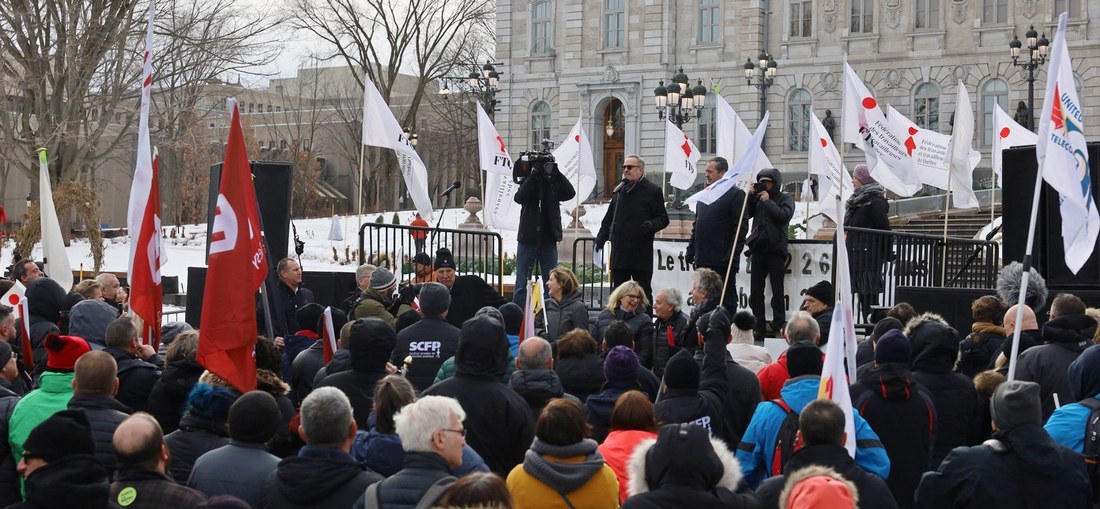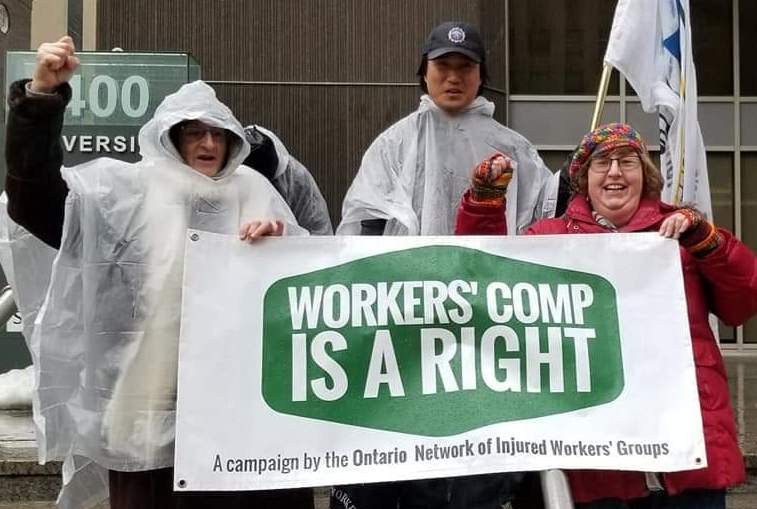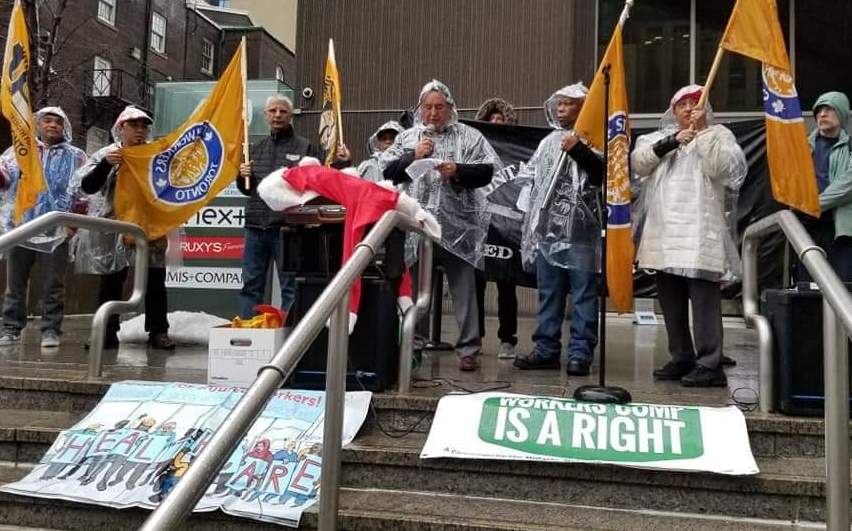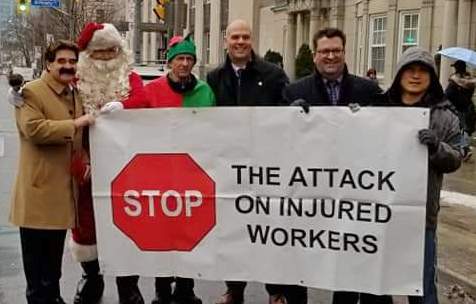|
December 11, 2019
32nd Congress of the Quebec Federation of Labour
Quebec Workers' Movement Rises to Challenges Posed by the Times
- Pierre Chénier -

Interview
• Urgent Need to Improve Wages and Working Conditions of Seniors' Residences Employees
- Sylvie Thomassin, Union Delegate, Quebec Union of Service Employees-FTQ
No to Nation-Wrecking!
• Lowe's Companies Inc. Shutters 34 Stores Across Canada
• Lowe's' Stalking of RONA and the Failure of Canada's Political Institutions
and Leaders to Defend Nation-Building
- K.C. Adams
Fix Workers' Comp Now!
• Ontario Injured Workers Hold Spirited Rally at Ministry of Labour
British Columbia
• Tentative Agreement Reached for SkyTrain Workers
32nd Congress of the Quebec Federation of Labour
- Pierre Chénier -
The Quebec Federation of Labour (FTQ) held its 32nd
Congress in Quebec City from November 25 to 28 under the theme "In
Action in a Changing World." Over 900 delegates took part in the
proceedings. With the observers and guests, the total number of people
each day in the hall was slightly over 1000. The FTQ has about 600,000
members from the private and public sectors, including construction,
mining and metallurgy, communications, forestry, health care and other
sectors.
The main events of the Congress were the opening
speech by FTQ President Daniel Boyer, the presentation and adoption of
policy papers and demands on occupational health and safety, on
pharmacare, and on automation and digitalization of the economy.
Workshops were also held on automation and digitalization of the
economy in
which delegates and observers were divided into six discussion groups.
The Congress organized a mass demonstration on November 27 at the
National Assembly to demand pro-worker reforms to the Act respecting occupational health and safety.
Elections to the positions of President and Secretary General of the
federation were held.
Ninety-five resolutions were adopted on topics ranging from the FTQ
Constitution, occupational health and safety, precarious employment and
the Quebec Labour Code,
to defence of public services and of the workers that provide them, and
the natural environment, among others. There were also presentations by
experts on the topics of the
platform economy and on technological changes and the transformation of
the workplace.
Daniel Boyer was acclaimed for a third term as FTQ
President and Denis Bolduc, from the Quebec section of the Canadian
Union of Public Employees, was acclaimed as Secretary General,
replacing Serge Cadieux who is moving to the FTQ's Solidarity Fund.
In his opening speech, Boyer explained that the theme
"In action in a changing world" refers mainly to environmental change
and automation and digitalization of the economy and the impact of
these developments on labour, jobs and rights. The FTQ, he said, is
working for a just transition for workers and unions in response to
these changes.
Other challenges, he said, are to preserve and rebuild public services
and to improve working conditions in the sector, improve health and
safety conditions for all workers, and the need for pharmacare.
According to Boyer, the framework under which the FTQ is
working is the preservation of the Quebec model of the Quiet Revolution
and its adaptation to the new realities so that Quebec becomes greener,
more just, with fewer inequalities and more solidarity and that the FTQ
remains a recognized and legitimate player in Quebec society.
Throughout the Congress, workers spoke eloquently about the problems and challenges they are facing.
The Congress demanded the establishment of a publicly
managed, universal, accessible, fair, viable and independent pharmacare
system in Quebec.
On the issue of social programs and public services,
workers demanded immediate substantial improvements for the most
vulnerable workers, especially those who work in public and private
seniors' residences. Many workers intervened to say that their
contribution in caring for those who built the modern Quebec must be
recognized,
especially in terms of wages which remain abysmal and make it
impossible to retain and attract workers in the sector. The whole
Congress rejected with contempt the statement of Quebec Premier
François Legault, who said his government would not negotiate
with the workers providing public services but would impose wage
settlements limited to the cost of living for most workers and slightly
more for beneficiary attendants and low-paid teachers.

Demonstration during the FTQ Congress in support of striking workers in
private seniors' residences, November 26, 2019.
The discussion on occupational health and safety took
place in the context of the Quebec government's announcement that in
2020 it will amend both the Act respecting occupational health and safety and the Act respecting industrial accidents and occupational diseases. Delegates denounced the fact that 40 years after the Act
respecting occupational health and safety was passed, its four prevention mechanisms are applicable to only 12 per cent of Quebec workers.[1]
Article 2 of the Act says: "The object of this Act is
the elimination, at the source, of dangers to the health, safety and
physical well-being of workers. This Act provides mechanisms for the
participation of workers, workers' associations, employers and
employers' associations in the realization of its object."
That is not true, workers said, and deeds of government
belie its words. Construction workers gave the example of the crane
operators who are under vicious attack by the Quebec government and the
Quebec Construction Commission who have reduced the training standard
for these workers, which puts not only their lives at risk but the
lives
of the public as well. This is done, among other things, under the hoax
of fighting what they call the attempt of the crane operators' union to
exercise control over other unions representing other construction
trades, as if this was a power struggle between different unions. This
is a good illustration of what kind of "participation of workers,
workers' associations" this Act contemplates. Changes have to be made
on the ground, workers said, with workers having a decisive say to
determine the health and safety conditions at their worksites and how
they are protected by the Act, with all the prevention mechanisms in
the law applicable to all workers. Workers also said that adequate
compensation has to be provided to all workers who are injured or
become ill at work. They demanded the end of employers' systematic
challenges of workers' compensation claims because this deprives the
injured workers of the money they need, money which belongs to them by
right and is essential for them to live a dignified life. These
challenges and deprivation makes their injuries and illness even worse.

 Demonstration at the National
Assembly to Demand Pro-Worker Reform of the Act respecting occupational
health and safety, November 27, 2019. Demonstration at the National
Assembly to Demand Pro-Worker Reform of the Act respecting occupational
health and safety, November 27, 2019.
Workers also spoke eloquently on the issue of automation
and digitalization of the economy. They support technological change,
which should improve their lives at work, but in the hands of the
private monopolies is being turned into a gigantic dehumanizing and
spying machine used against them. As one worker said in one of the
workshops, "Robots are turning us into robots." He explained that all
the actions of workers on the job are being spied on electronically and
then companies make accusations against the workers, demanding to know
what they were doing at such and such a time since they seem to have
not been moving. Companies monitor the pace of work achieved by
workers, and once a worker exceeds the standard, even once, their
performance becomes the new mandatory standard for all, set without
discussion or input from the workers. Others explained that metadata
gathered by the companies includes a great deal of personal information
on individuals which is used against them. For example, workers'
comments on social media are routinely spied on by companies which then
discipline workers for alleged 'lack of loyalty' to the company.
Metadata is being used to spot those who may become labour activists or
may want to unionize, so as to take repressive action against them.
There were many interventions in the workshops on what
is called the platform economy, with monopolies like Uber or Amazon
claiming that their digital platforms make them mere intermediaries
between different users. This is used to deny any link of employment
with people working for them and therefore any obligation to provide
pensions and benefits and anything else that may be claimed by workers
through regular employment. Those workers are often fraudulently
labelled "self-employed" and live a life of total instability and often
of extreme poverty while totally dependent on these monopolies for
their living.
Many demands were put forward such as amendments to both
the Canada and Quebec Labour Codes to change the definition of
"employee" so it includes these workers who are falsely labelled as
self-employed. Workers also demanded the strengthening of privacy laws to
prohibit companies keeping personal information on workers without
their permission.
The main point that workers made is that all of this is
making it very difficult for workers to affirm their collective
strength and to wage an organized collective struggle for their rights.
New forms have to be found, workers said, to solve the problem of
exercising the organized strength of the collective of workers, their
ability to discuss and
work out stands that are favourable to themselves and society, and to
fight for them in an effective way. Workers are not distressed by these
problems but are actively working to find new ways of organizing that
are appropriate in the existing conditions.
It is becoming more and more clear that workers'
reference point when they wage struggles is not a desire for the past
and forms belonging to a civil society that has been wrecked. The
workers' reference point is their current fight for rights which they
are waging in the battlefield of public opinion. It is in these battles
that new forms are being
created which correspond to the content workers are bringing forward,
including a new direction for the economy that serves the people and
not the rich and over which the people can exercise control.
The workers' interventions allowed them to work out how
the problems they face pose themselves and expressed their
determination to overcome the challenges. This made for an exciting and
lively FTQ Congress.
Note
1. These mechanisms are the
prevention program, the health program, the employer-worker joint
health/safety committee and the prevention representative.

Interview
- Sylvie Thomassin, Union Delegate, Quebec Union
of Service Employees-FTQ -

Strike days at Seniors' Private Residences in
Quebec, November 2019.
Workers' Forum: Workers in seniors'
residences, public and private, are fighting for immediate and urgent
improvements in their working conditions. You work at the Manoir et
Cours de l'Atrium, a private seniors' residence. Can you tell us about
these conditions?
Sylvie Thomassin: Our situation is
particularly difficult at the moment because we are short of staff. We
have to deal with this every day because we do not have many regular
employees. We deal with agencies to get workers and have to adapt to
the people they send to us. We have a work routine. When the workers
from the
agencies arrive at our institutions they do not know how they work.
Practically every day we have to do training to show them how we
operate in the residence. This creates extra work and also extra
stress, because at the wages the agencies are paying, the people they
recruit frequently do not show up for work. So it's more work that has
to be
done by our members.
Owners of private residences have difficulty recruiting
a regular workforce. All goes well until it comes to the question of
wages. The moment we come to the question of wages, people who would be
interested in coming to work with us give up. We try to make the
employer understand that the wages are not competitive, that's why they
have
trouble getting people. The employer persists in saying that we are in
a labour shortage, without wanting to get to the bottom of the problem.
We have dishwashers who make as little as $13 an hour. We do not have a
pension plan and have no health insurance, no drug insurance.
We work for a company that is listed on the stock
exchange, Chartwell, one of the biggest players in private residences
for seniors. Chartwell makes millions every year. We take care of the
people from whom they are making money. At the Manoir et Cours de
l'Atrium the cheapest apartment costs about $3,000 a month. Our
residence has
680 apartments. It is the largest private residence for seniors in
Quebec.
Yet at the bargaining table, the employer says it has no
money to give to the employees to keep them in its establishments.
Meanwhile, Chartwell private residences continue to open. The company
already has difficulty putting staff in the existing residences yet is
opening new ones. What kind of service will the people get at these
residences?
Our wages are much lower than in the public sector. Our
nurses work double shifts too. In our residence, we are currently
experiencing an outbreak of gastroenteritis. Our dining room waitstaff
are delivering meals on the floors because one of the dining rooms has
been closed. It is a huge increase in the work load. The employer asks
us to do
this and we do it, but we are offered nothing in return. It's pure
exploitation. It is normal for our people to think of going to work
elsewhere.
In its advertising, Chartwell speaks about the
well-being of older people, but does not provide the staff needed to
actually do so. I went back to school at age 50 to get a cooking degree
to gain advancement. I have not been paid much more for this. The
employer is asking for skills qualifications but does not want to pay
for qualifications.
We are not currently in negotiations, but we support
those who are. Some are staging one-day strikes at this time. Employees
are demanding a wage of $15 at the time of hiring and a minimum
increase of $1 per hour each year for the duration of the agreement. We
will be negotiating next fall.
Something also has to be done at the government level.
The government needs to step in and make employers understand that they
have to sit down at the bargaining table, raise the wages, listen to
the unions and the members they represent, who have legitimate demands.
The Quebec Union of Service Employees (SQEES) and the
whole Quebec Federation of Labour are also demanding that the Legault
government introduce a collective agreement decree to improve the lot
of those who work in seniors' residences. This decree would set the
minimum conditions of employment that all employers in the sector
must respect.
WF: Is there anything you would like to add in conclusion?
ST: I hope that the people will support
our demands and our actions because it is important. We must keep in
mind that we too will one day find ourselves in these residences. We
must not allow conditions to deteriorate as is happening now. We must
respect the dignity of the elderly. They need stability. Anything can
destabilize them. When you're old, you're vulnerable. Seniors need to
be cared for by people who also have stability in their working
conditions. We do not get recognition for the work we do and that must
change.

No to Nation-Wrecking!
In a surprise announcement on November 20, Lowe's
Companies
Inc. from the U.S. said it was closing 34 stores in Canada, most
of which it seized only recently with its takeover of RONA in
2016. The U.S. retail giant said it will close 26 RONAs, six
Lowe's, and two Réno-Dépôts this coming
January and February.
Almost a third of the closures are in Quebec, where 12 stores are
affected. Nine stores will be closed in Ontario, six in Alberta,
three in Nova Scotia, three in BC and one in
Saskatchewan.[1]
 The 34 closures
bring to 61 the number of Canadian stores
Lowe's has shuttered during the last two years. It closed 27
Canadian locations in 2018 -- 24 of them recently bought RONAs --
along with regional support centres in Mississauga, Ontario and
St. John's, Newfoundland, a truss plant in St. John's,
Newfoundland and a block plant in Kamloops, BC. Just last month
Lowe's terminated 60 workers at its Canadian headquarters in
Boucherville, Quebec. Lowe's did not say how many workers' lives
will be turned upside down this time with the loss of their work
and livelihoods. The 34 closures
bring to 61 the number of Canadian stores
Lowe's has shuttered during the last two years. It closed 27
Canadian locations in 2018 -- 24 of them recently bought RONAs --
along with regional support centres in Mississauga, Ontario and
St. John's, Newfoundland, a truss plant in St. John's,
Newfoundland and a block plant in Kamloops, BC. Just last month
Lowe's terminated 60 workers at its Canadian headquarters in
Boucherville, Quebec. Lowe's did not say how many workers' lives
will be turned upside down this time with the loss of their work
and livelihoods.
RONA was founded in 1939 in Quebec and soon became
a large
retail marketer for hardware goods and building supplies. As
such, it developed a relationship with both the forestry industry
in Quebec and building contractors. The rise of RONA as a chain
of big box stores corresponds with the general decline of the
small family business in the retail sector throughout the
imperialist system of states and the trend towards concentration
of the socialized economy, social wealth and political power into
fewer and fewer private hands. This trend, left unchecked, has
resulted in a growing dominance over Canada by the U.S. financial
oligarchy.[2] As continental integration into the U.S. Empire
proceeded unabated, the result has been a Fortress North America
and the loss of any semblance of local, Quebec or Canadian
control of the economy.
As can be seen from the list of store locations to
be closed,
they are mostly in smaller communities where the oligarchs in
control of Lowe's do not consider the scale of operations to be
sufficiently lucrative. The trend of imperialism militates
against rational nation-building in favour of the pursuit of
maximum profit without regard for the lives and well-being of the
people or local economies and Mother Earth. Working people,
especially the youth, have been forced to seek work in ever
larger metropolises such as Montreal, Toronto or the BC lower
mainland.
In the regions of Quebec and elsewhere, such as in
Prince
George in BC, the Lowe's-forced closures appear in part to be
connected with attacks on the local economies, such as the forestry
sector and other industries. A lack of investments to diversify
local economies has made them vulnerable to crises. The working
people of Bécancour, which will lose its RONA store,
recently had
to endure an 18-month Alcoa/Rio Tinto lockout of 1,000 ABI
smelter workers, aided and abetted by the Quebec government and
Hydro-Quebec.
RONA stores in Bécancour, Nicolet, and
Trois-Rivières, as well
as the Réno-Dépôt in
Trois-Rivières and a Lowe's in Prince George,
among others in smaller centres, are earmarked for closure. These
attacks on the regions are forms of nation-wrecking to serve the
profit-mad international financial oligarchy whose considerations
are based on sucking out tribute from around the world to satisfy
their private interests.
The working people cannot and will not accept these
assaults on the economic and social fabric of their lives.
Nation-wrecking reflects the lack of control the working people
have over their economy and the events that affect their lives.
An alternative is possible! Join the determined movement for
democratic renewal and empowerment of the people so together we
can bring into being a new pro-social direction for the economy
that favours the people and a nation-building project in
opposition to the power, control and wrecking of the
international financial oligarchy.
Notes
1. List
of store
closures announced by Lowe's on November 20:
|
British
Columbia
|
Closing
date
|
|
Lowe's
Prince George
|
2999
Massey Drive
|
February
19, 2020
|
|
RONA
Surrey (Newton)
|
6965
King George Boulevard
|
January
31, 2020
|
|
RONA
Osoyoos
|
6014-51
Street
|
January
31, 2020
|
|
Alberta
|
|
|
Lowe's
Calgary - Shawnessy
|
295
Shawville Boulevard S.E.
|
February
19, 2020
|
|
RONA
Airdrie
|
2649
Main Street South
|
January
31, 2020
|
|
RONA
Calgary (Midnapore)
|
14815
Bannister Road S.E.
|
January
31, 2020
|
|
RONA
St.
Albert
|
730
St. Albert Trail
|
January
31, 2020
|
|
RONA
Sherwood Park
|
340
Baseline Road
|
January
31, 2020
|
|
RONA
Edmonton
(Ellerslie Road)
|
1003
Parsons Road S.W.
|
January
31, 2020
|
|
Saskatchewan
|
|
|
Lowe's
Regina - North
|
489
Albert Street North
|
February
19, 2020
|
|
Ontario
|
|
|
Lowe's
Etobicoke - North
|
48
Lowe's Place
|
January
31, 2020
|
|
Lowe's
Thunder Bay
|
1000
Fort William Road
|
January
31, 2020
|
|
Lowe's
Cornwall
|
950
Brookdale Avenue
|
January
31, 2020
|
|
RONA
Brockville
|
550
Stewart Boulevard
|
January
31, 2020
|
|
Home
& Garden RONA - Cambridge
|
66
Pinebush Road
|
January
31, 2020
|
|
RONA
Mississauga
|
Rockwood Mall, 4141
Dixie Road
|
January
31, 2020
|
|
Reno-Depot
Aurora
|
140
First Commerce Drive
|
January
31, 2020
|
|
RONA
Oshawa
|
1279
Simcoe Street North
|
January
31, 2020
|
|
RONA
Ajax
|
19
Notion Road
|
January
31, 2020
|
|
Quebec
|
|
|
RONA
Granby
|
316
rue Denison Est
|
January
31, 2020
|
|
RONA
Sorel
|
1293
chemin des Patriotes
|
January
31, 2020
|
|
RONA
Bécancour
|
3365
boulevard Bécancour
|
January
31, 2020
|
|
RONA
Nicolet
|
2145
boulevard
Louis-Fréchette
|
January
31, 2020
|
|
RONA
Saint-Tite
|
700
rue Notre-Dame
|
January
31, 2020
|
|
RONA
Trois-Rivières
|
15
rue Philippe-Francoeur
|
January
31, 2020
|
|
RONA
Saint-Félix-de-Valois
|
3110
rue Henri-L. Chevrette
|
January
31, 2020
|
|
RONA
Carignan
|
2395
chemin de Chambly
|
January
31, 2020
|
|
RONA
Saint-Lambert
|
707
rue Saint-Charles
|
January
31, 2020
|
|
RONA
Saint-Sauveur
|
180
rue Principale
|
January
31, 2020
|
|
RONA
Bellefeuille - Saint-Jérôme
|
905
boulevard de la Salette
|
January
31, 2020
|
|
Réno-Dépôt
Trois-Rivières
|
4575
boulevard des Forges
|
January
31, 2020
|
|
Nova
Scotia
|
|
|
RONA
Dartmouth (Windmill Road)
|
500
Windmill Road
|
February
19, 2020
|
|
RONA
Dartmouth (Harbour)
|
1000
Cole Harbour Road
|
February
19, 2020
|
|
RONA
Bedford
|
1658
Bedford Place Mall
|
February
19, 2020
|
2. Other recent U.S.
imperialist attacks on the retail sector in Canada:
Target and
Zellers Closures: Disastrous Years for Workers,
Suppliers and Others
(Excerpt)
By 2014, Target had renovated and opened 133
stores across
Canada, most of them former Zellers leaseholds, hiring 17,600
workers and selling pharmacy franchises for most stores. Suddenly
on January 15, 2015. Target filed for bankruptcy protection for
its Canadian operations under the Companies' Creditors
Arrangement Act (CCAA) and announced the closure of all its
operations within two months. All its
workers were told they were fired and pharmacy franchise
operations and coffee shops were discontinued. Once again, retail
workers became collateral damage in an economic system that is
destructive, to say the least, and over which they have no control
or say. (TML
Weekly, February 14, 2015.)

- K.C. Adams -
 The significance
of the takeover of RONA is found in the
revelation that local people and especially the working class
have no control over the direction of the economy. They do not have
control where profits go and are invested, where the commodities
a company sells are bought or sourced, how a company can be
renewed to better serve the economy and people, and fundamentally,
whether a company will live or die. Also revealed is the fact
that the people cannot find help from the so-called liberal
democratic institutions as they have proved in practice to be
impotent in the face of the attacks of the global financial
oligarchy and do its bidding.
The significance
of the takeover of RONA is found in the
revelation that local people and especially the working class
have no control over the direction of the economy. They do not have
control where profits go and are invested, where the commodities
a company sells are bought or sourced, how a company can be
renewed to better serve the economy and people, and fundamentally,
whether a company will live or die. Also revealed is the fact
that the people cannot find help from the so-called liberal
democratic institutions as they have proved in practice to be
impotent in the face of the attacks of the global financial
oligarchy and do its bidding.
The U.S. giant corporation Lowe's began its
campaign to seize
RONA in 2012. Similar to other dominant companies in the retail
sector, such as Walmart and the internet giant Amazon, Lowe's is
not a company unto itself but a merged financial, industrial,
commercial and real estate empire controlled by the financial
oligarchy.
The public rumblings of a Lowe's takeover of RONA
began in
earnest in July 2012 prior to a Quebec election. The noise of a
U.S. takeover provoked a reaction in the mass media and amongst
the cartel political parties vying for power. They all pronounced
themselves in favour of "doing something" to block Lowe's
takeover of RONA.
The "doing something" was described in the media
as
"government-controlled or government-friendly financial
institutions collectively but independently acquiring a blocking
position in the shareholders' equity of 'strategic'
companies."[1]
Only a few
years later in 2016, both the federal and Quebec governments and
the "government-friendly financial institutions" that took an
ownership position in RONA stock capitulated when Lowe's returned
with an "offer they and the government of the day couldn't
refuse." RONA was sold to Lowe's because without upholding
principles of nation-building, pragmatism rules the day; this
means those in control can find and propagate an excuse to
capitulate to the power of the global financial oligarchy.
Opposition parties in the Quebec National Assembly
criticized
the Liberal government of Phillip Couillard for allowing RONA's
sale to Lowe's, with some members even predicting disaster for the
regions. On the receiving end of particularly heavy abuse was
Minister of the Economy Jacques Daoust, who had been President and
Chief Executive of Investissement Québec (IQ) from 2008 to
2013
before entering the Liberal cartel party government as an elected
member of the National Assembly in 2014. Under Daoust's
direction, IQ acquired a 10 per cent stake in RONA so that
-- presumably as a "government-controlled financial institution" -- it
could help save RONA from a foreign takeover. However, when
Lowe's offer to buy became real in 2016 the resistance caved in
to pragmatism. IQ and the Liberal governments in both Ottawa and
Quebec (including Jacques Daoust the Minister of the Economy)
officially approved the sale.
 Soon after RONA's
sale to Lowe's was announced and approved by
the Couillard government in 2016, Jacques Daoust resigned as
Minister of the Economy. Later in the year, he resigned from the
National Assembly and died suddenly in 2017 from a stroke. His
personal papers, made public after his death, reveal that in fact
he had been opposed all along to the RONA sale. According to
Daoust, Premier Couillard's Office concluded the sale
behind his back without his knowledge. In his memoir, he accuses
the Liberal government or more specifically the Premier's
Office of pressuring him, after the fact, to agree to the sale as
Minister of the Economy and then lie in public that he
participated in making the legal and political arrangements for
the sale and was in complete agreement. Soon after RONA's
sale to Lowe's was announced and approved by
the Couillard government in 2016, Jacques Daoust resigned as
Minister of the Economy. Later in the year, he resigned from the
National Assembly and died suddenly in 2017 from a stroke. His
personal papers, made public after his death, reveal that in fact
he had been opposed all along to the RONA sale. According to
Daoust, Premier Couillard's Office concluded the sale
behind his back without his knowledge. In his memoir, he accuses
the Liberal government or more specifically the Premier's
Office of pressuring him, after the fact, to agree to the sale as
Minister of the Economy and then lie in public that he
participated in making the legal and political arrangements for
the sale and was in complete agreement.
Within two years following RONA's sale to Lowe's,
the axe
began to fall, described by financial analyst Yvan Allaire as,
"pressure in the markets [on Lowe's CEO and Board] for lacklustre
performance. Its Canadian operations [i.e., RONA] had become a
drag on earnings. [...] Lowe's is listed on the New York Stock
Exchange and thus must deliver on the only commitment that really
counts: doing everything to maintain and drive up the price of
its stock. At stake in that very real day-to-day drama are the
jobs of its senior executives and the quantum of their
compensation. Any hesitation or delay in taking all necessary
measures to meet the shareholders' expectations will be severely
and swiftly punished. That is the inexorable law of financial
markets." One cannot help but comment that "at stake in that very
real day-to-day drama are the jobs" of the men and women who work
at RONA and the communities and local economies where the closures
occur.
Lowe's first wave of closures of RONA stores was
announced
just one month after the Coalition Avenir Québec cartel
party
government of François Legault took power in October 2018,
with
the second wave a year later for a total of 61 stores closed
across Canada. The response of the CAQ in power has been quite
different than when in opposition when it denounced the Liberal
Party government for agreeing to the sale.
The CAQ Minister of the Economy, Pierre Fitzgibbon,
went so
far as to blame Quebeckers for the closures, lamenting a
weakening of their emotional attachment to the RONA brand since
the Lowe's takeover. "There's a breakage of emotional connection
between Quebeckers and RONA and I understand why," Fitzgibbon
told reporters, saying he too prefers to shop at Quebec-owned
stores. Fitzgibbon added that the CAQ government could do nothing
because it was bound by a confidentiality agreement between Lowe's
and the federal government, signed during the takeover in
2016. Some people working in RONA stores denounced Fitzgibbon for
suggesting the closures were fine by him because he "prefers to shop at
Quebec-owned stores." They pointed out that the workers suffering the layoffs are Quebeckers, and that the other big-box
building supply store company in Quebec, Home Depot, is also not Quebec-owned.
 Lowe's said the
closures are in compliance with the 2016
purchase agreement signed with the federal government. The
Trudeau government appears to agree and will not intervene. A
statement from the federal Ministry of Innovation, Science and
Economic Development says it closely monitors these commitments
"on an ongoing basis to ensure compliance." Lowe's said the
closures are in compliance with the 2016
purchase agreement signed with the federal government. The
Trudeau government appears to agree and will not intervene. A
statement from the federal Ministry of Innovation, Science and
Economic Development says it closely monitors these commitments
"on an ongoing basis to ensure compliance."
CAQ Minister Fitzgibbon remarked that compliance
was not very
difficult: "Let's be realistic, this agreement is on a
page and a half. So the commitment on that page is kind of soft.
[...] My job is just to call the federal government to make sure
they enforce what they signed in 2016. But it's pretty soft."
CAQ Premier François Legault, who in 2016 criticized the
Couillard Liberal government for not blocking the sale, describes
the two waves of RONA store closures under his government as
"unfortunate," adding nothing can be done because "RONA is owned
by Lowe's. It's a private company."
The impotence of the so-called liberal democratic
institutions
is on full display at all levels of government in this affair.
The form and content of those institutions are incapable of
defending the people, economy and nation-building from the
ravages of the global financial oligarchy.
Democratic renewal and empowerment of the people
are the order
of the day to defend the people's rights and interests and forge
a new pro-social direction for the economy that favours the
people.
Note
1. All
quotes are
from "Rona's tragedy in three acts: From Quebec's foreign
takeover block, to deal with Lowe's, to store closures," Yvan
Allaire, Financial Post, November 22, 2019.

Fix Workers' Comp Now!

Injured workers and their allies rallied at the
Ministry of Labour on December 9 demanding the Ford government stop its
attacks on injured workers and take two immediate actions to fix
problems in the Workers' Compensation system as well as the provincial
regulations governing workplace safety. Their first demand is that the
government pass
private member's Bill 119, currently before the legislature, which
would end the practice of deeming. This practice impoverishes injured
workers by cutting their benefits based on considering them to be
employed at non-existent jobs. Secondly, they demand that section 83(4) of
the current Workplace Safety and Insurance Act, which holds employers, not
the temp agencies responsible when temp agency workers are injured or killed at their places of work, be brought into force.
The injured workers' call to Fix It Now! is also a
demand that the Ontario government end the situation where millions of
dollars are handed to employers through lower WSIB premiums while
injured workers are denied benefits. To Fix It Now! also requires
implementation of the other demands of the Workers' Comp Is a Right!
campaign: listen to injured workers' treating physicians, not paper
doctors; reverse the cuts to legal aid; and end the denial of claims on
the grounds of so-called pre-existing conditions.
This year's action was organized by the Ontario Network
of Injured Workers' Groups (ONIWG) together with the $15 and Fairness
Campaign. The organizations who participated included the United
Steelworkers, Workers Action Centre, the OFL Power of Many campaign,
injured workers legal aid clinics, Injured Workers Action for Justice,
Canadian Federation of Students, and the Workers' Centre of the
Communist Party of Canada (Marxist-Leninist). "Workers' Comp Is a
Right" ponchos were donated by the railway workers union. Both new and
seasoned injured workers' activists participated in the spirited
action, with two new members proudly hoisting the ONIWG banner in the
steady rain.
The annual Christmas actions, which have taken place for
the past 28 years, highlight the hardships faced by injured workers and
their families during the holidays, as well as their impoverishment
throughout the year. This year has been particularly difficult with the
brutal attacks of the Ford government on social programs relied upon by
all
Ontario workers, as well as cuts to the funding of specialized legal
clinics on which injured workers depend for legal assistance and
advocacy for their rights.
 
 
 
Actions also took place in Sudbury and Windsor. In
Sudbury a small but lively information picket took place, while the
main rally was rescheduled to December 16 due to poor weather.
Windsor

Sudbury


British Columbia
After close to an 18-hour bargaining session,
negotiators for 900 SkyTrain workers, members of the Canadian Union of
Public Employees (CUPE) Local 7000, reached a tentative agreement with
the BC Rapid Transit Company (BCRTC) just minutes before 5:00 am on
December 10 when workers were set to begin strike
action. The workers are train and station attendants, control
operators, administration staff, technicians and maintenance workers.
BCRTC is a wholly owned subsidiary of TransLink, the provincial
government legislative body which oversees public transit operations in
Metro Vancouver.
According to a Vancouver Sun report published
shortly after the tentative agreement was reached, CUPE Local 7000
President Tony Rebelo stated that it "goes a long way to address many
of the union's concerns..." No details will be released before the
ratification vote. Negotiations for a new contract have been ongoing
since August
31 when the old contract expired. The union served 72-hour strike
notice on December 6, following a 96.8 per cent vote in favour of job
action.
Workers are seeking wages acceptable to themselves, an
end to compulsory overtime, improved staffing and changes to sick leave
provisions.

(To access articles individually click on the black headline.)
PDF
PREVIOUS
ISSUES | HOME
Website: www.cpcml.ca
Email: office@cpcml.ca
|




 Demonstration at the National
Assembly to Demand Pro-Worker Reform of the
Demonstration at the National
Assembly to Demand Pro-Worker Reform of the 

 The 34 closures
bring to 61 the number of Canadian stores
Lowe's has shuttered during the last two years. It closed 27
Canadian locations in 2018 -- 24 of them recently bought RONAs --
along with regional support centres in Mississauga, Ontario and
St. John's, Newfoundland, a truss plant in St. John's,
Newfoundland and a block plant in Kamloops, BC. Just last month
Lowe's terminated 60 workers at its Canadian headquarters in
Boucherville, Quebec. Lowe's did not say how many workers' lives
will be turned upside down this time with the loss of their work
and livelihoods.
The 34 closures
bring to 61 the number of Canadian stores
Lowe's has shuttered during the last two years. It closed 27
Canadian locations in 2018 -- 24 of them recently bought RONAs --
along with regional support centres in Mississauga, Ontario and
St. John's, Newfoundland, a truss plant in St. John's,
Newfoundland and a block plant in Kamloops, BC. Just last month
Lowe's terminated 60 workers at its Canadian headquarters in
Boucherville, Quebec. Lowe's did not say how many workers' lives
will be turned upside down this time with the loss of their work
and livelihoods. Soon after RONA's
sale to Lowe's was announced and approved by
the Couillard government in 2016, Jacques Daoust resigned as
Minister of the Economy. Later in the year, he resigned from the
National Assembly and died suddenly in 2017 from a stroke. His
personal papers, made public after his death, reveal that in fact
he had been opposed all along to the RONA sale. According to
Daoust, Premier Couillard's Office concluded the sale
behind his back without his knowledge. In his memoir, he accuses
the Liberal government or more specifically the Premier's
Office of pressuring him, after the fact, to agree to the sale as
Minister of the Economy and then lie in public that he
participated in making the legal and political arrangements for
the sale and was in complete agreement.
Soon after RONA's
sale to Lowe's was announced and approved by
the Couillard government in 2016, Jacques Daoust resigned as
Minister of the Economy. Later in the year, he resigned from the
National Assembly and died suddenly in 2017 from a stroke. His
personal papers, made public after his death, reveal that in fact
he had been opposed all along to the RONA sale. According to
Daoust, Premier Couillard's Office concluded the sale
behind his back without his knowledge. In his memoir, he accuses
the Liberal government or more specifically the Premier's
Office of pressuring him, after the fact, to agree to the sale as
Minister of the Economy and then lie in public that he
participated in making the legal and political arrangements for
the sale and was in complete agreement. Lowe's said the
closures are in compliance with the 2016
purchase agreement signed with the federal government. The
Trudeau government appears to agree and will not intervene. A
statement from the federal Ministry of Innovation, Science and
Economic Development says it closely monitors these commitments
"on an ongoing basis to ensure compliance."
Lowe's said the
closures are in compliance with the 2016
purchase agreement signed with the federal government. The
Trudeau government appears to agree and will not intervene. A
statement from the federal Ministry of Innovation, Science and
Economic Development says it closely monitors these commitments
"on an ongoing basis to ensure compliance."